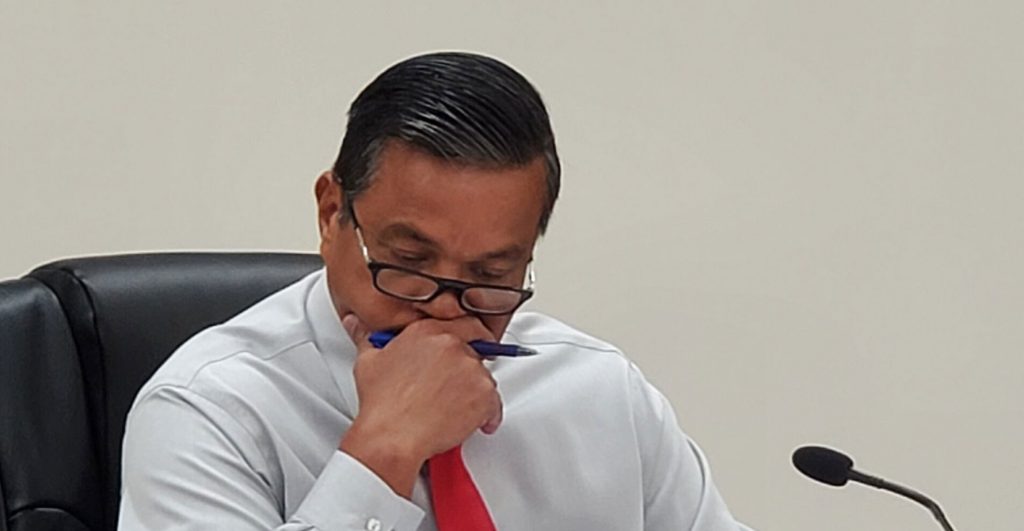Senate OKs commercial rate for CHCC’s utilities
The Senate passed Friday a bill that would mandate the Commonwealth Utilities Corp. to change the power, water, and wastewater rate for the Commonwealth Healthcare Corp. from the current government rate to the lower commercial rate.
With five senators voting “yes,” one voting “no,” and three excused absences, Senate Bill 23-37, SD1 now goes to the House of Representatives for action.
The five senators who voted “yes” were Senate President Edith E. DeLeon Guerrero (D-Saipan) and Sens. Jude U. Hofschneider (R-Tinian), Corina L. Magofna (Ind-Saipan), Francisco Q. Cruz (R-Tinian), and James Mendiola (R-Rota). Sen. Celina R. Babauta (D-Saipan) was the sole “no” vote. Sens. Paul A. Manglona (Ind-Rota), Donald M. Manglona (Ind-Rota), and Karl R. King-Nabors (R-Tinian) were absent but excused.
Hofschneider, Magofna, and Donald M. Manglona are the co-authors of the legislation.
Befire voting, Babauta asked that the bill be tabled or referred back to the committee. She said the Public Utilities Commission board is responsible for establishing the rates for utilities and that these can be fixed with regulations—not legislation.
She pointed out that, at the Senate Executive Appointments and Government Investigations Committee confirmation hearing last June 16 for James Sirok and Dr. Jack Angelo, who were nominated by Gov. Arnold I. Palacios to the Public Utilities Commission, a question directly related to what this bill proposes was posed on both nominees.
Babauta said that Sirok cautioned the Legislature from introducing such legislation because it would put the onus on the other two classes of ratepayers: households and the commercial ratepayers. She said it would be unfair to households and commercial ratepayers to subsidize CHCC.
“I’m not trying to neglect the needs or abandon the needs of CHCC,” Babauta said, but she believes that with the confirmation in the near-future of Sirok and Angelo—whom she described as experts in the field of utilities—the senators should give them every opportunity to do their own research and make the proper determination as to what the rate adjustments should look like today, rather than rush to judgment and pass the bill.
Hofschneider said Babauta made valid points, but this is not the first time that they have introduced this legislation and that for every day that they wait is every day that CHCC is going to risk being shut down because of unpaid utilities arrears.
Hofschneider said it’s an injustice also for senators to continue neglecting the obvious situation currently being faced by CHCC when the Legislature is unable to properly give CHCC the needed funds to address the operations and their obligations such as the utilities and, recently, medical referral.
He said the issues will not go away for CHCC and that he understands that PUC will be the commission tasked to oversee the rates.
“But are we going to wait for months again to continue the deliberation on what rates CHCC should be paying? Or should we put this to rest?” Hofschneider asked.
He said they can revisit this with CHCC when the PUC is in order.
“When this thing is booked since 2011 it doesn’t look good on their financial portfolio. There’s no way that they are going to pay the $58 million that is before them,” Hofschneider said.
Babauta said that CHCC has waited for years to pay their utilities, so there should be no rush to regulate by legislation. She said they don’t have to wait for months as the two nominees will hopefully be confirmed by the end of this month.
“It is so unfair to put this onus on households who are suffering right now because of high utility rates,” she added.
Before voting “yes” to pass the bill, Senate President Edith E. DeLeon Guerrero (D-Saipan) said that when the bill passes the Senate that day, it will be transmitted to the House of Representatives for further deliberation.
“Therefore, for the record, nobody’s rate changes,” she said.
According to the bill, CHCC should not have to subsidize CUC by paying the higher utility government rate. Instead, CHCC should be classified as a commercial entity and charged commercial utility rates, similar to every other healthcare provider in the CNMI.







